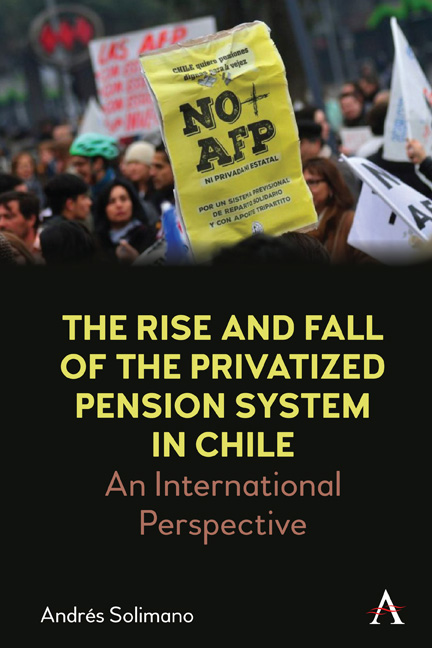Book contents
- Frontmatter
- Contents
- Acknowledgments
- 1 Introduction
- 2 An Overview of Social Security: Purposes, Modalities and Historical Evolution
- 3 The Rise and Fall of Pension Privatization in Latin America and Central and Eastern Europe
- 4 The Evolution of Social Protection and Pension Systems in Chile from the 19th Century until Its Privatization in the 1980s
- 5 Empirical Elements for Evaluating the Privatized Chilean Pension System
- 6 Synthesis and Conclusions: Reform Paralysis and the Road to De-privatization
- References
- Index
4 - The Evolution of Social Protection and Pension Systems in Chile from the 19th Century until Its Privatization in the 1980s
Published online by Cambridge University Press: 24 March 2021
- Frontmatter
- Contents
- Acknowledgments
- 1 Introduction
- 2 An Overview of Social Security: Purposes, Modalities and Historical Evolution
- 3 The Rise and Fall of Pension Privatization in Latin America and Central and Eastern Europe
- 4 The Evolution of Social Protection and Pension Systems in Chile from the 19th Century until Its Privatization in the 1980s
- 5 Empirical Elements for Evaluating the Privatized Chilean Pension System
- 6 Synthesis and Conclusions: Reform Paralysis and the Road to De-privatization
- References
- Index
Summary
Introduction
This chapter presents a historic overview of the origins and evolution of social insurance, pension schemes and labor legislation in Chile since the mid-19th century until the privatization of the pension system in the early 1980s, during the Pinochet regime. The analysis seeks to place the evolution of social protection and pension systems in the broader context of the development strategies followed by the country in different periods of its history along with their corresponding political background. It is important to note that both in the colonial period and after independence, economic elites (national and foreign) have been very important as owners in mining, finance, industry and agriculture activities and have wielded very significant political and public policy influences.
Consequently, Chile is a country of deep structural inequalities of incomes, wealth, access to social services and political power. Nonetheless, this inequality and entrenched power structures have also been contested by mass movements and progressive political parties. In the early 20th century, Chile faced the eruption of an organized labor movement that sought to redress the most acute manifestations of poverty and social exclusion; this was the so-called cuestión social. Social protest and the influences of the Mexican Revolution (1910) and even the Russian Revolution (1917) conducted to a situation in which new social and labor legislation was adopted in Chile in the mid-1920s. In 1925 young army officers sensitive to the social situation of the masses pressed Congress and the political class, after a delay, to adopt progressive new laws.
The prevailing literature on social security in Latin America 1stresses the influence of organized social groups and relatively powerful sectors in society such as the army and civil servants to secure for themselves social insurance and pension systems. In line with these theories in Chile, the military, the national police (Carabineros), civil servants, railway workers, merchant navy workers, employees of the banking system were also able to set up cajas (pension and health boards) with higher benefits than those received by manual workers (the obreros). Rural workers and the self-employed were often excluded from formal social security. However, pressure groups have success in pressing for their demands when the overall social situation features poverty, inequality and exclusion.
- Type
- Chapter
- Information
- The Rise and Fall of the Privatized Pension System in ChileAn International Perspective, pp. 51 - 76Publisher: Anthem PressPrint publication year: 2021

